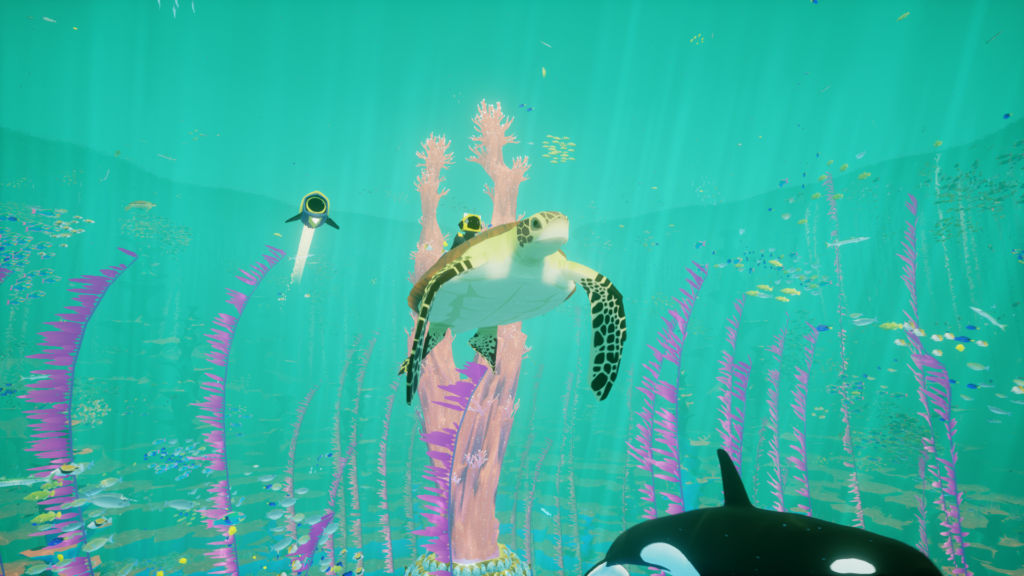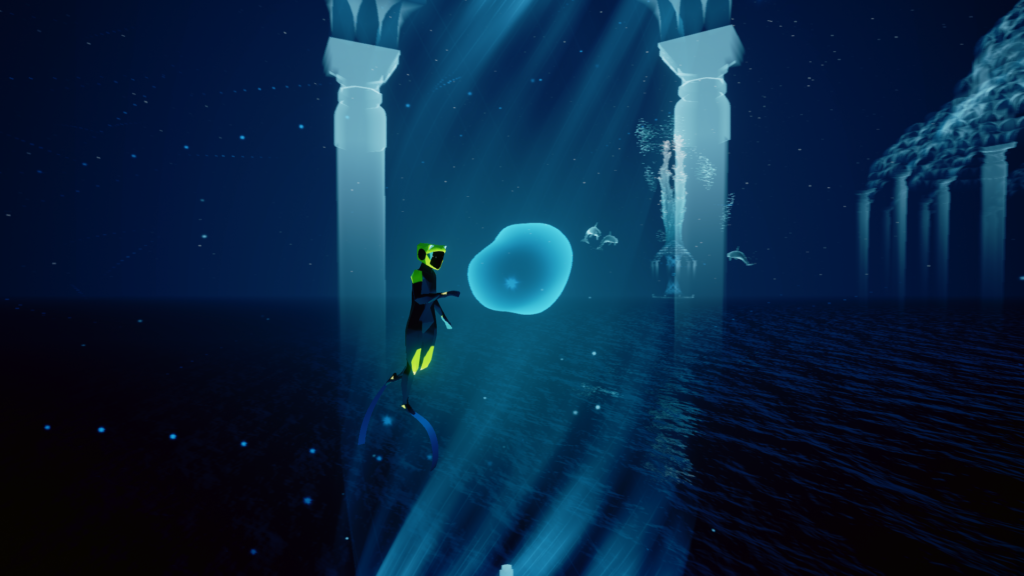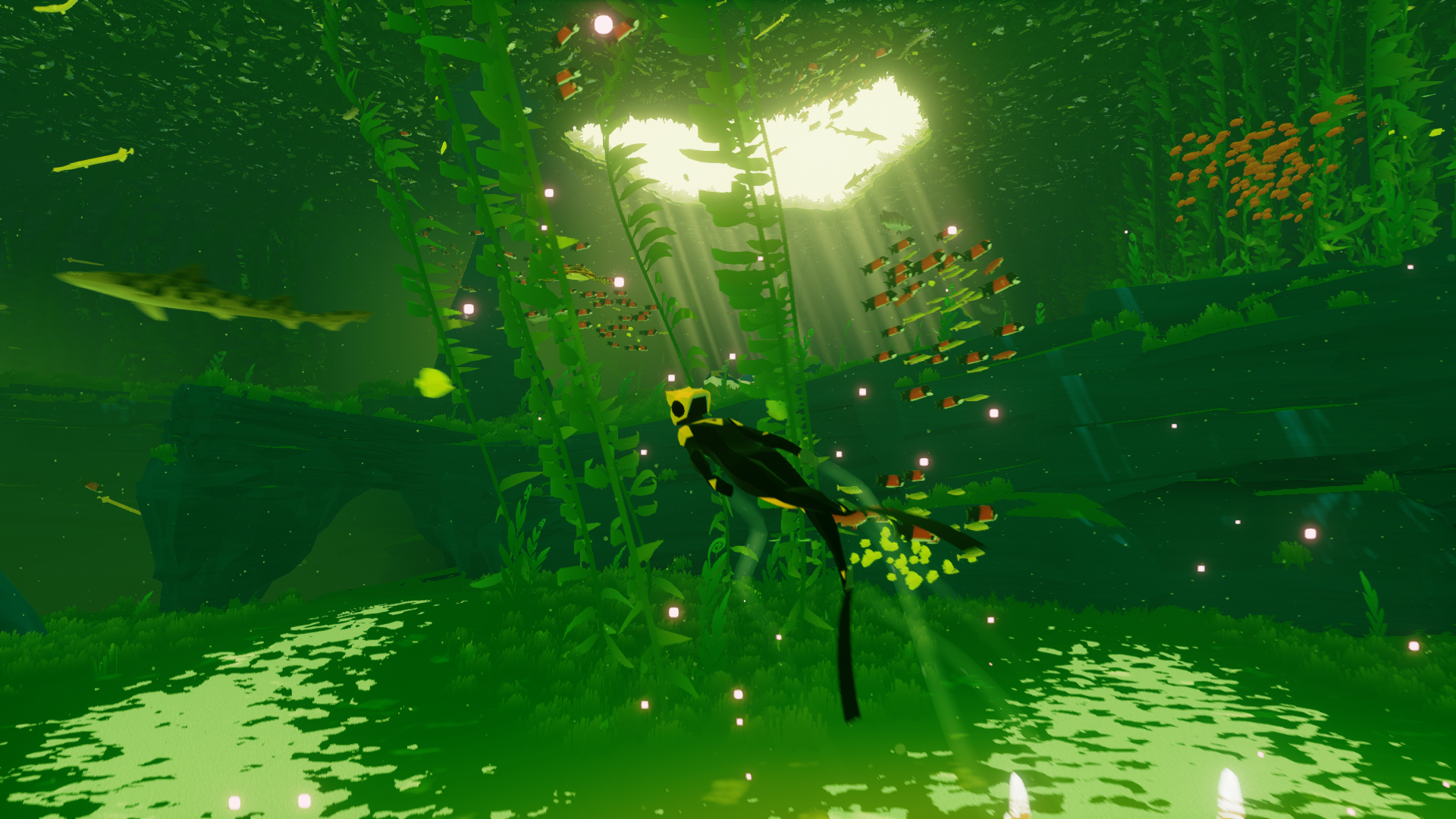Developed by: Giant Squid Studios
Released: August 2, 2016
Price: $19.99 (PC, PS4)
In the wake of 2012’s beloved Journey, developers thatgamecompany were finally free from their three-game contract with Sony (which also produced Flower and Flow). A few of the creative minds left to form a new company and make what could be called a spiritual successor to Journey. ABZÛ is a short, beautiful storytelling game from newly-formed developer Giant Squid Studios in which players explore a breathtaking ocean environment to uncover a mysterious story.
On one hand, it’s virtually impossible to talk about ABZÛ without making a lot of comparisons to Journey and (to a lesser extent) Flower. However, since ABZÛ released for both PC and PS4, it will be the first chance for non-Playstation-owners to play any of the games from these creative teams. In light of that, I’m going to start with how ABZÛ stands on it’s own and then discuss how it compares to its spiritual predecessors.

An Ocean Game that’s Not Terrifying
With the exception of the awkward, fish-petting Wii series Endless Ocean, the majority of games with underwater settings are full of tension and fear. ABZÛ is a departure from this, filled with colorful underwater spaces whose only purposes are to be explored and lightly interacted with. It’s mechanically light, with the only true “game” aspects being the hidden collectibles that can be found throughout and some obstacle navigation. Players interact with the world by swimming around and pinging objects of interest or catching a ride with various sea creatures. Moving around underwater is occasionally awkward, but the controls are implemented fairly well and there’s never any hurry to do something or get somewhere. The entire game takes only a few hours to complete, but more time could certainly be spent finding all the collectibles.
As players explore, ABZÛ delivers small fragments of narrative through interactions with objects in the environment and cryptic murals upon the walls of underwater temples. As with Journey and Flower, the wordless storytelling provides some universality and a fairytale-like atmosphere. ABZÛ weaves a beautiful enigmatic tale, partly inspired by the Enûma Eliš (the Babylonian creation myth), as the player meanders through its gorgeous environment. Along the way, players can also find small statues on which to pause and meditate, which allows them to identify and see from the perspective of the various types of marine life in the particular area. While controlling the meditation mode can a odd (it’s tricky to switch your view to the creature you want to look at) it’s a nice way to get a closer look at some of the creatures that were so lovingly crafted and animated to fill the world of ABZÛ.
Visually, the game is absolutely stunning. Utilizing the powerful Unreal Engine 4, ABZÛ fills it’s ocean world with forests of gently waving kelp and plant life and hundreds and hundreds of fish, turtles, squid, and all manner of other sea creatures rendered in vibrant colors. The game has a slightly cel-shaded look that nicely complements the dancing sunbeams that fill many of the spaces, but on some of the bigger creatures can seem a bit sparse in terms of detail. Composer Austin Wintory once again creates a grand, atmospheric soundtrack this time with a more choral style.

A Worthy, If Similar, Entry into the Pantheon
This game is not the first of its kind. The way to ABZÛ was paved by the design and iteration of Flower and Journey before it. Despite being even more visually impressive, ABZÛ feels a little bit less thematically consistent than it’s predecessors. Its story doesn’t quite seem to have the overall cohesiveness of something like Journey. However, it has everything else that it needs in terms of visuals, atmosphere, and inspired environment art and design to stand toe to toe with Journey. If anything, it’s biggest shortcoming is that it’s a little too structurally similar to Journey, even including one very small portion that’s essentially a complete knock-off of a similar moment from Journey.
Despite the familiarity, though, it all still works incredibly well. The game maintains a unique identity mostly by virtue of its wildly different setting, even if some of the atmosphere and mood is similar. Following the formula might rob it of some of its novelty but doesn’t really take away from the enjoyment of the experience. As with it’s predecessors, ABZÛ‘s art, soundtrack, and design all demonstrate an incredible degree of polish and attention to detail. All things considered, ABZÛ remains a breathtaking and worthwhile experience in spite of its parallel structure.
Despite some similarities to its creators’ previous work, ABZÛ is a uniquely beautiful game that will delight new and old fans alike. If you like games that are heavy on beautiful art and light on challenge and effort, this is absolutely for you.

of its* kind. cool stuff
Fixed. Thanks for pointing that out.